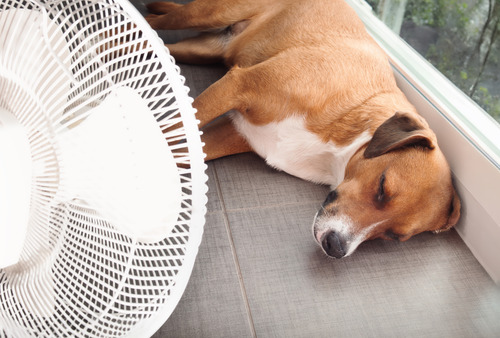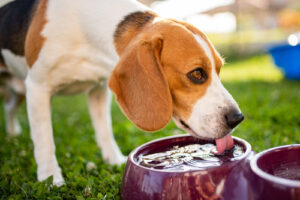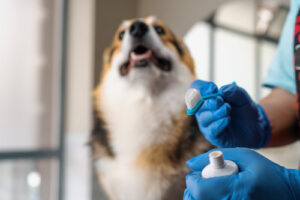Houston’s heat can wear on all of us—but it’s especially tough on our dogs. While panting and seeking shade are natural ways dogs cope, they can’t always tell us when they’re running low on fluids. Dehydration in dogs can develop quickly and quietly, and without intervention, it may lead to serious health issues. Whether your dog loves spending hours outside or tends to lose interest in their water bowl, the team at Sunset Animal Hospital can help you know what to watch for in your canine companion. In this blog, we’ll walk you through the causes, warning signs, treatment options, and ways to help prevent dog dehydration year-round.
What Causes Dog Dehydration?
Dog dehydration happens when fluid loss exceeds fluid intake. This can occur for a variety of reasons and is often a symptom of an underlying issue.
Environmental Triggers
Hot weather, especially during Houston’s sweltering summers, is one of the leading causes of dog dehydration. Extended periods outdoors without shade or access to water can quickly lead to fluid loss. Even indoor pets are at risk if air conditioning isn’t adequate or they don’t have frequent access to fresh water.
Physical Activity and Overexertion
Dogs that play hard or go on long walks without rest or rehydration breaks are more likely to become dehydrated. This is especially true for active breeds and working dogs, but it can affect any dog who overexerts themselves in warm or humid conditions.
Illness and Medical Conditions
Vomiting, diarrhea, fever, and certain diseases like kidney issues, diabetes, or infections can contribute to dehydration in dogs. These conditions either cause fluid loss or interfere with the body’s ability to retain moisture, increasing the risk.
Recognizing the Signs of Dog Dehydration
Catching dehydration early makes a significant difference in your dog’s recovery. While some signs may be obvious, others can be easy to miss if you’re not paying close attention.
Subtle Behavioral Changes
Dogs experiencing dehydration might appear tired, disinterested in food, or less enthusiastic about play. These signs can mimic other health issues, so it’s important to consider the context—especially if the weather has been hot, or your dog has been sick recently.
Physical Symptoms to Watch For
One of the easiest ways to check for dog dehydration is to gently pinch the skin between your dog’s shoulders. In a hydrated dog, the skin will snap back quickly. If it stays tented or returns slowly, that can indicate fluid loss. Other physical signs include:
- Dry or tacky gums
- Sunken eyes
- Excessive panting
- Thick saliva
- A dry nose
If your dog shows several of these symptoms at once, it may be time to contact your veterinarian at Sunset Animal Hospital.
How Veterinarians Treat Dog Dehydration
Once dehydration is identified, your veterinarian will determine the cause and severity to guide treatment. Mild cases might only require oral rehydration and monitoring, while moderate to severe dehydration needs more intensive care.
Fluid Therapy Options
Veterinarians often administer subcutaneous or intravenous fluids to quickly restore hydration. This method allows fluids to enter the bloodstream directly, helping stabilize your dog more efficiently than oral water intake alone.
Treating the Underlying Cause
Rehydrating your dog is only the first step. Your veterinarian will also investigate why your dog became dehydrated in the first place. If illness is the culprit, they may prescribe medication or recommend further diagnostics to rule out chronic conditions.
What You Can Do to Prevent Dog Dehydration at Home
The best way to protect your dog from dehydration is through proactive prevention. You can reduce their risk significantly by making a few simple adjustments to their daily routine and environment.
Encourage Regular Hydration
Make sure your dog has constant access to clean, cool water both indoors and outside. Some dogs may need a little encouragement, so you can try the following:
- Add a splash of low-sodium broth to their water
- Offer water-rich foods like cucumbers or ice cubes as treats
- Use pet-safe water fountains to stimulate interest in drinking
Prepare for Heat and Humidity
In Houston’s heat, dogs can lose moisture quickly—especially during midday hours. Walk your dog early in the morning or later in the evening, and always bring water along. If your dog will be spending time outside, provide shaded areas and frequent hydration breaks.
Adjust Activity Based on Weather
If it’s especially hot or humid, limit strenuous exercise. Older dogs, brachycephalic breeds (like Bulldogs and Pugs), and those with medical conditions are particularly vulnerable to dehydration and heat-related issues.
Monitor for Illness
Dogs experiencing vomiting or diarrhea are at higher risk of dehydration. Even if symptoms seem mild, consult your veterinarian if your dog refuses food or water for more than a day or has multiple episodes of gastrointestinal upset.
Red Flags to Signal It’s Time to Call Your Veterinarian
Dog dehydration can turn serious quickly. If your dog is showing signs of fluid loss and not improving with rest and water, it’s time to seek professional care. Dehydration may indicate an underlying condition that needs immediate attention. The team at Sunset Animal Hospital in Houston is here to help. Call us at (713) 526-5881 or book an appointment online to have your dog evaluated. Timely treatment not only addresses dehydration but can also uncover issues that may otherwise go unnoticed. Our goal is to get your dog feeling like themselves again—hydrated, healthy, and happy.





